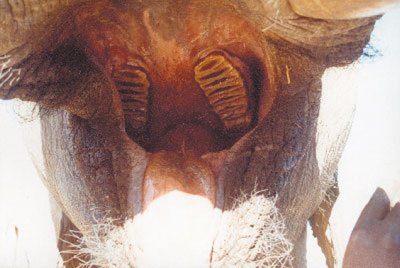February is Dental Health Month for pets. This is a chance to
have your pet’s teeth examined, and if necessary, cleaned for a
reduced rate at many veterinary hospitals.
February is Dental Health Month for pets. This is a chance to have your pet’s teeth examined, and if necessary, cleaned for a reduced rate at many veterinary hospitals. Dental tartar is more than just a source of bad breath. Tartar traps large amounts of bacteria that can lead to loss of teeth and infection. So talk to your pet’s veterinarian and ask about your pet’s teeth. A simple exam can determine whether or not your cat or dog needs a professional cleaning.
And now, here’s an interesting question about dental health that you may have never heard before.
Q:
Do elephants have the same kind of teeth that we have? I haven’t ever seen any teeth in their mouth. How do they chew their food?
A:
Wildlife is full of fascinating differences, and elephants are definitely unique when it comes to their teeth. Domestic animals and people get two sets of teeth in their lifetime.
Elephants differ both in the number of teeth they have throughout their life, and in the way those teeth come into their mouth. These giant pachyderms get new teeth six times, but the replacements don’t erupt from underneath the existing dentition. Instead, new teeth appear in the back of the mouth and push old teeth forward.
Newborn elephant calves are usually born with two small molars in both the upper and lower jaw. These first teeth are only the size of your thumbnail.
Later on, another slightly larger molar tooth comes in and slowly moves from the back to the front, replacing the old tooth. This process repeats a total of six times and the teeth get progressively larger to where the fifth and sixth molars are the size of bricks when they come into the mouth.
This impressive dentition is necessary so that elephants can forage on the roughage that makes up the majority of their diet. When the last teeth wear down in older elephants, there are no replacements.
The geriatric pachyderm loses his ability to adequately chew food. He seeks softer vegetation usually around waterways or swamps. But eventually even this vegetation becomes useless because he just can’t break it down. He succumbs to weakness and undernutrition because he’s unable to eat well enough to survive.
Q:
Our cat, Tema, has become really weak and tired all the time. The vet ran a blood test and found that she has anemia and she has a parasite named Haemobartonella in her blood. Now we’re worried we might lose her. Does the treatment work?
A:
Haemobartonella felis is a parasite of red blood cells that can be transmitted by insect bites. It causes serious anemia and sometimes jaundice. And you really should worry about Tema because without treatment, this infection can be fatal. Some cats with Haemobartonella also are infected with the Feline Leukemia virus, so you should be sure that she is tested for this disease as well.
Haemobartonella can be treated, but relapses are common. Perhaps the best thing would be to keep Tema inside at all times to avoid exposure to biting insects. Besides, kitties that live indoors have a much longer life expectancy (15 years compared to only 5 years for outside cats). Part of this is because they are less exposed to the dangers of parasites and other hazards.
Q:
We’re moving to a different city and don’t know how to choose a veterinarian for our dog and cat when we get there. I see some veterinarians advertising in the local phone book and newspaper. One even has a really nice Web site. What is the best way to find the best vet care for our pets?
A:
Advertising has really become important in the different medical professions. On the television or in mass mailings, you’ll see ads where all you have to do is dial an 800 phone number to get a referral to a “really great” doctor or dentist.
I believe looking through advertisements is probably the worst way to find your best veterinarian, dentist or doctor. And calling an 800 phone number for a referral is no better because all too often, these advertisers recommend professionals who have simply paid a fee to be on their list.
There are no guarantees that these doctors will be reliable. Don’t believe everything you hear or see. Signs stating that someone is voted best in the area can be misleading. Advertising is designed to attract new clients, and can be very convincing. Unfortunately, it may also sometimes be a bit exaggerated.
The very best way to find a good veterinarian or dentist or medical doctor is to ask friends and neighbors who they prefer. Word-of-mouth advertising is always the best way to find someone to care for your pet or your family.












